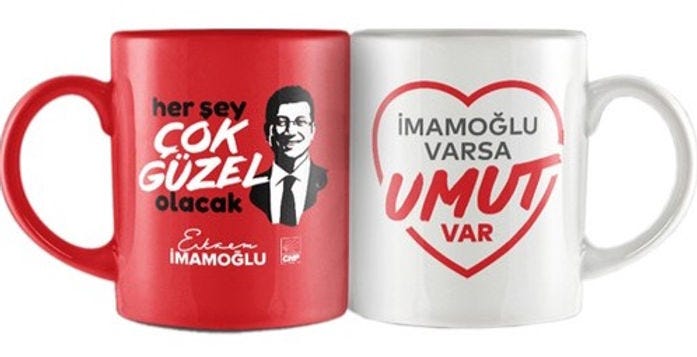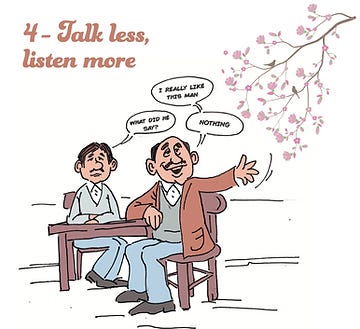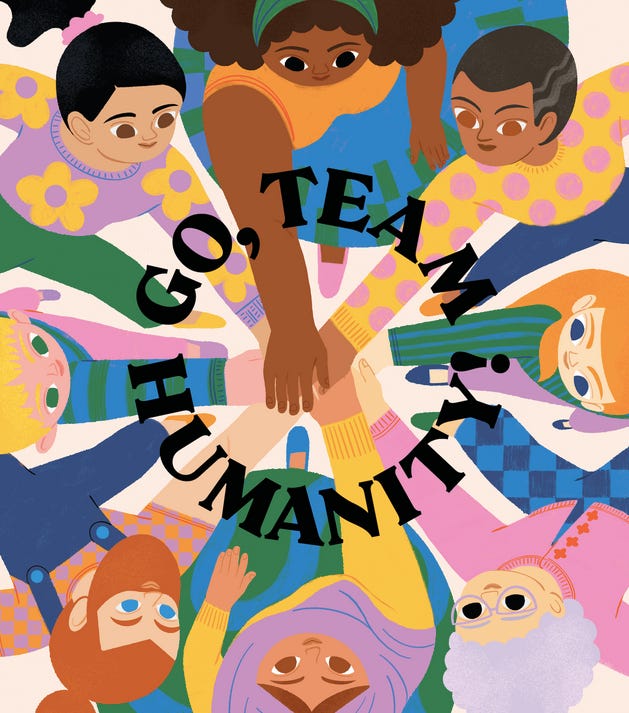What's love got to do with it?
How to apply radical love to politics, and win. [With exclusive book extract!]
Why hope is populist kryptonite: The Book of Radical Love
In 2019, Ekrem İmamoğlu won the Istanbul mayoral election not once, but twice. The first time around, the authorities controversially annulled the election.
You might expect a progressive leader to be bitter and indignant on the evening of that decision. Instead, İmamoğlu gave a speech that set the tone for the radical love campaign he was about to lead:
“In our squares there is love. They will want conflict from us, they will want to hear harsh words from us. But we, the people who do not want this nation to fight, who want this nation to embrace, we will unrelentingly embrace each other.”
These were not just words, they were backed up with a campaign manual instructing party activists how to put the words into practice.
It was called The Book of Radical Love, and it was a radical change of strategy for the opposition.
Short, simple and full of amusing, self-mocking New Yorker style cartoons, it told opposition activists that the majority of people care more about day-to-day issues like garbage collection than political scandals.
Here were some of the tenets of the campaign, all spelled out in the little Book of Radical Love distributed to CHP activists across the Turkish capital that year:
Talk less and listen.
Talk about local issues (garbage collection) not what worries you the activist (democracy).
Reframe what the campaign is about: rich versus poor not secular versus religious.
Smile!
The CHP strategist who wrote the radical love booklet, Ateş İlyas Başsoy, was very clear that this was about tranquilising the fear that can become so contagious in our social media world:
“We so easily hate things. We like [things] easily. It’s a world of like and dislike. I call this the expanse of shallowness. Within this extraordinary shallow world, people emerge who would direct these small feelings, like an orchestra conductor.”
“In a society in which everything can be changed and decided in seconds, we have several feelings that we hold onto. These feelings are, fear, [and] as a result of this fear, obedience, worshipping the father and being brought under his wings.”
The radical love campaign was about much more than resisting the provocations of the ruling party. It was underpinned by a deep understanding of what constant anxiety is doing to our brains, how easy it is for a leader to come along and stir fear in us, and how that fear makes us seek a strong leader.
Keep calm and keep hope
The radical love campaign was all about staying calm in the face of crisis, conflict, controversy and cynicism.
Indeed, they took their message of calm so far as to emblazon even on their coffee cups, which read: “Everything will be fine…if there is hope.”
This doesn't mean "it will be fine no matter what". It means ”we are going to keep going and will win again and deliver”. In other words, it was hope as determination and resilience.
Remember: fear and despair paralyse us. But we need people to act, and to get behind change, which is not easy for brains to do in stressful times, when we are primed to reject the unfamiliar.
I love the message being on a coffee cup because that is such a familiar object reminding us of our cosy kitchens at home. It is preparing us to think with our upstairs brain.
I also love the message being delivered on a coffee cup because if people actually use the cup it will presumably be with a warm drink, which presuasion experts tell us makes people ready to accept new proposals. Even just seeing the cup should prompt us to think of the feeling of holding that warm drink in our hands. It is a great example of the way we deliver a message being as important as the actual content of that message.
Hope is resistance: a determination not to let populists change our brains so that we operate in fear and self-interest.
After all, at a fundamental level, progressive politics is built on the extent to which people care about other people.
Bassoy explains why they avoided criticising populist supporters and talked instead about caring about everyone, moving the debate away from divisions , and instead focusing on what people had in common:
“Against the ideology saying, “There are evil people out there,” being able to say, “There are actually a lot of good people out there,” is a way of fighting as well. If we are going to fight, we must do it with flowers.
“We accept these differences as our richness, but the moment these differences set us up against each other, we state that this is harmful and try to find new commonalities.”
This is a hopeful, shared humanity worldview: where our core underlying idea is that human brings are fundamentally good, capable of change and progress. Believing this is an essential defence of the cynicism and fatalism that feeds populism. If humans are good, it is worth making an effort to work together. If not, then we are justified in just looking after ourselves and our own group at the expense of others.
In this context, human rights work depends on cultivating this radical love is the love Martha Nussbaum also speaks about:
“There is a type of love that ...simply consists in seeing the other person as fully human, and capable at some level of good and of change.”
This is what Martha Nussbaum calls the constructive work of hope: the listening and the cooperation that we need to nurture to make our societies more resistant to the fear that enables populist authoritarianism.
By fighting less and listening and hugging more, Imamoglu showed people that they could change their minds and support him instead of the AKP. By appearing to listen to them, he made them open to his alternative.

He changed the narrative not with his words, but with his action. He listened. He hugged. He loved, radically.
You can read the full chapter here. Next week I’ll continue these theme with some practical tips, also excerpted from the book, for applying radical love to counter populist politics. I’m grateful to Krizna Gomez for bringing this story to my attention.
How do we do political love?
Here is why the Istanbul campaign matters, according to Eke Temelkuran at the Othering & Belonging conference in 2023 (I’m paraphrasing!):
Radical love sounds naive but it works on the ground. It can work on much higher level as well. We need faith in humanity to defend against fascism, which makes us all rotten inside. We are not immune to the effects. When something happens we turn on each other.
Thinkers and activists should come together to think, test each other and find out how to bring radical love to politics.
Why love matters for justice
If you want to read more about radical love, I suggest philosopher Martha Nussbaum’s Political Emotions: Why Love Matters for Justice. It is a deep and moving reflection on the intersection of culture and law - how the two need to progress together:
“Good laws rarely come into being or remain stable over time without emotional support. Thus, at the same time as we figure out how to protect the rights of minorities by law (expecting that this itself will influence public emotions toward them), we should also think about shaping the emotional climate so that it supports and sustains good laws and institutions.”
I first developed hope-based communications to answer a similar challenge: what is the emotional climate we need for human rights to be respected; for people to have empathy and compassion for other humans?
Nussbaum argues that healthy democracies must be sustained by deep concern for other human beings, not just a distant utilitarian respect for the rights of others, otherwise we slide into self-interest:
“Respect on its own is cold and inert, insufficient to overcome the bad tendencies that lead human beings to tyrannize over one another. Disgust denies fundamental human dignity to groups of people, portraying them instead as animals. Consequently respect grounded in the idea of human dignity will prove impotent to include all citizens on terms of equality unless it is nourished by imaginative engagement with the lives of others and by an inner grasp of their full and equal humanity. … The type of imaginative engagement society needs … is nourished by love.”
Nussbaum inspires my belief that human rights work should not only be about the “rights” part, but about cultivating our love for our fellow humans, simply because they are human. Nussbaum recommends using public art and culture to “they take people out of themselves and forge a shared community”. This offers new strategic avenues for movements who feel their space for political action is shrinking.
Let’s end with another Nussbaum quote from her other book that is seminal hope-based reading, Monarchy of Fear, in which she describes political love between humans:
“There is a type of love that ...simply consists in seeing the other person as fully human, and capable at some level of good and of change… Hope needs to embrace something that flawed human beings are capable of and might really do.”
Hopey, changey stuff
The Radical Love campaign is a perfect example of what jon a. powell and OBI call bridging. In this essay, powell and his OBI colleague (and friend of the h-b community!) Sara Grossman calling the progressive movement to avoid fragmentation in order to counter authoritarianism.
Also at the OBI conference, Yasmeen Daher spoke powerfully about Gaza and shared a vision of a future where Palestinians and Jews can live together - a vision that we should be centering in our activism. Very important to hear and amplify Palestinian voices right now.
You can find belonging-themed artwork commissioned by OBI and Fine Acts here. And now, you can also commission Fine Acts to produce similar art banks for your cause. Having worked with them on collections to visualize human rights and hope, we can thoroughly recommend!
Last week I forgot to mention an exciting new tool launched at Confluence by IRIS by Mia Deschamps: the NARRATIVE DIRECTORY! It is a much-needed database of all the organizations working on narrative around the world. You can go and add yourself if you are missing. Grateful to IRIS for offering this to our movement.
Community news
Happy to announce a new hope-based certification: Civocracy! They already ran their first workshop using the hope-based approach, as part of their Participatory Storytelling Academy for social SMEs.
Events
Virginia Vigilar is running a narrative change online workshop called Ecological Approach to Masculinities.
Liberties continue to provide substantial body of narrative change material for Europe with a new course on Progressive Messaging.
Shift of the week - hate to love
Really simple. If we are against hate, what are we for?
With hate such a powerful force online, we need to find the strongest possible positive emotions to drive social change. And what could be more powerful than the most inherent human emotion of all? It feel awkward and naive to talk about love in political activism, but we need to learn how if we are to effectively counter hate. A/B testing we did to figure out the best way to generate passionate support among young, engaged EU audiences suggested doubling-down on love could be the way forward.
Quote of the week
“The ability to observe without evaluating is the highest form of intelligence” – Indian philosopher Jiddu Krishnamurti.
OK, I’m going to be honest that this came up on a meditation app. But it speaks to our brains instinctive capacity to categorize everything it encounters, usually according to an existing bias or our group’s current position.
What’s giving us hope
The Rugby World Cup ended this weekend, and while you have got to be inspired by Siya Kolisi and South Africa, my highlight was 50,000 Ireland fans singing the anti-war song Zombie (written by a singer from my hometown!). Goosebumps. Notably, some people who were anti- the anti-war song managed to create a narrative that the song was dividing fans (it wasn’t).










Inspiring stuff! I loved Temelkuran's book "Together". And some of the work in the love book remins me of deep canvassing (listening) mixed with common sense.